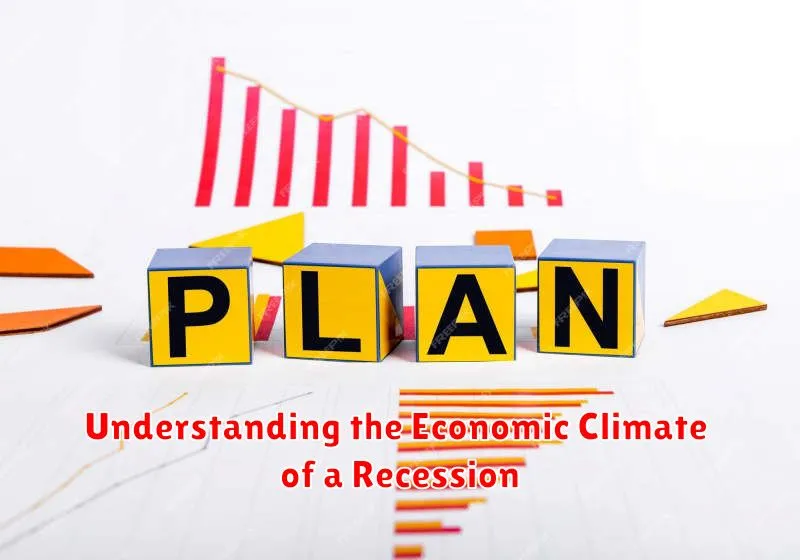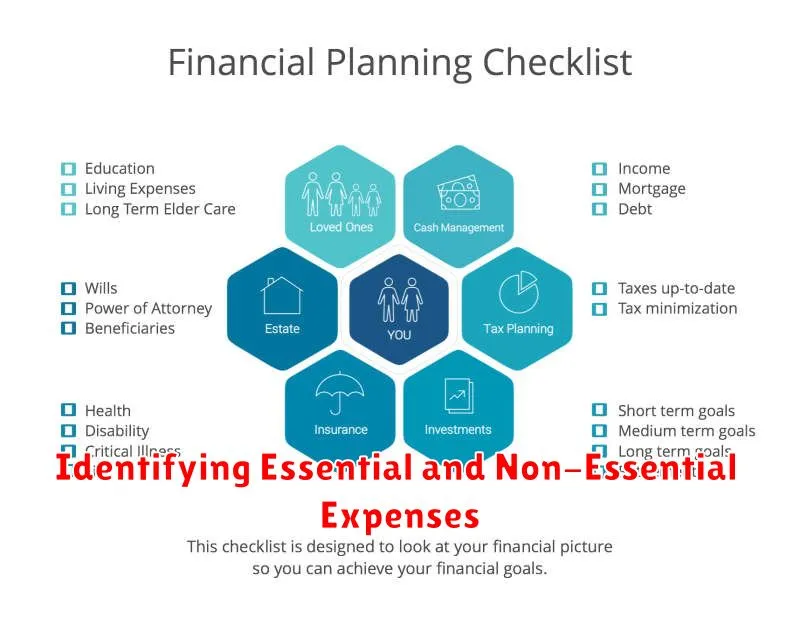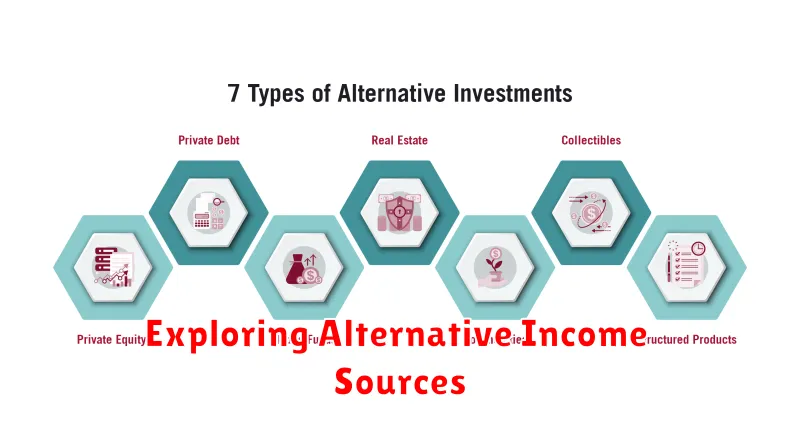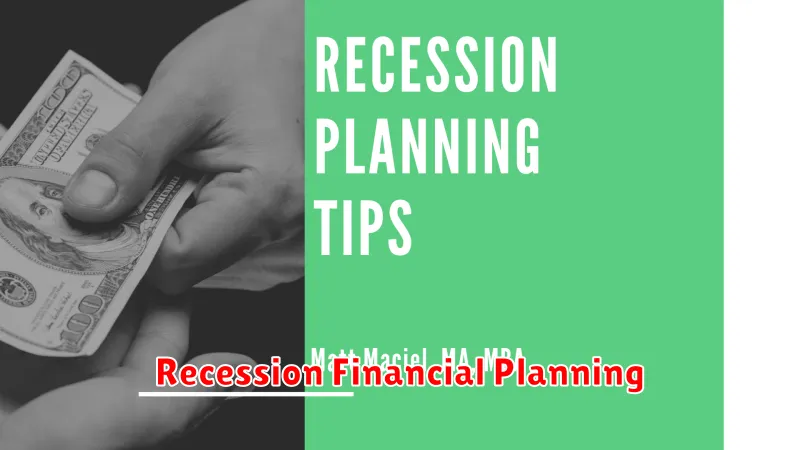Navigating the choppy waters of a recession can feel overwhelming, especially when it comes to your finances. With job security, market volatility, and rising costs all weighing heavily on your mind, making smart financial decisions can seem like an insurmountable task. But fear not! This guide will equip you with the tools and strategies to navigate the economic storm and emerge financially stronger than ever. From budgeting basics to investing insights, we’ll dive into the practical steps you can take to protect your savings, weather the downturn, and even seize opportunities that often arise during such times.
Whether you’re worried about a potential job loss, struggling with a stagnant income, or simply seeking ways to safeguard your financial future during a recession, this article is for you. By understanding the key principles of recession-proof financial management, you can gain confidence in your ability to navigate the current economic climate and emerge with your finances intact, if not enhanced. So, let’s roll up our sleeves and get started on building a strong financial foundation that will serve you well, both during and after the recession.
Understanding the Economic Climate of a Recession

A recession is a significant decline in economic activity that spreads across the economy and lasts for more than a few months. It is characterized by a decline in real gross domestic product (GDP), employment, investment, and consumer spending.
During a recession, businesses may lay off workers, and people may lose their jobs. This can lead to a decrease in consumer spending, which further slows down economic growth. The demand for goods and services also falls, leading to lower production levels and reduced business profits.
The economic climate of a recession can be challenging for individuals and businesses. It is a period of uncertainty and anxiety, with fears of job losses, wage cuts, and reduced purchasing power. Understanding the economic climate of a recession is crucial for making informed financial decisions.
Assessing Your Current Financial Situation and Budget

In times of economic uncertainty, it is crucial to take stock of your current financial situation. A recession can impact your income, expenses, and overall financial well-being, making it more important than ever to understand your finances and make informed decisions. The first step is to assess your current financial situation, which involves evaluating your income, expenses, assets, and liabilities.
Start by creating a detailed budget. This involves tracking your income from all sources, including wages, investments, and other forms of income. Next, list all your expenses, categorizing them by necessity (rent, utilities, groceries) and discretionary spending (entertainment, dining out, subscriptions). Be honest and thorough in your assessment, including any recurring bills, debt payments, and unexpected expenses.
Once you have a clear picture of your income and expenses, you can determine your net income (income minus expenses). Your net income will highlight your financial health and identify areas where you can potentially save money. This analysis helps you make informed decisions about your spending and prioritize essential expenses during tough times.
Beyond budgeting, evaluate your assets (what you own) and liabilities (what you owe). This assessment can help you identify potential sources of income or leverage for difficult times. For example, you might consider selling unused assets or consolidating debt to reduce monthly payments. This comprehensive analysis will provide a clear understanding of your financial standing and aid in making smart financial decisions throughout a recession.
Identifying Essential and Non-Essential Expenses

During a recession, it’s crucial to prioritize your spending and make smart financial decisions. One effective strategy is to differentiate between essential and non-essential expenses. This distinction helps you allocate your limited resources wisely and ensure your financial stability.
Essential expenses are those necessary for survival and well-being. They include:
- Housing (rent or mortgage)
- Utilities (electricity, gas, water)
- Food
- Transportation (car payment, public transportation)
- Healthcare (insurance premiums, medical bills)
- Debt payments (minimum payments on loans)
Non-essential expenses, on the other hand, are those that are not strictly necessary for survival. They may include:
- Entertainment (movies, concerts, dining out)
- Travel
- Subscriptions (streaming services, gym memberships)
- Shopping (clothes, electronics)
- Hobbies
By identifying these categories, you can create a budget that prioritizes your essential needs while minimizing unnecessary spending. This approach can help you stretch your finances further and navigate the challenges of a recession.
Strategies for Reducing Spending and Saving Money

Recessions can be a stressful time for everyone, but they can be especially difficult if you’re already struggling financially. During a recession, it’s important to be mindful of your spending and find ways to save money. There are a number of strategies you can use to make sure your money is working for you and to ensure your financial security during a challenging time.
One of the best ways to reduce spending is to create a budget and stick to it. This will help you to track your income and expenses, and identify areas where you can cut back. When creating a budget, you should prioritize your essential expenses, such as housing, food, and transportation. Then you can look for ways to reduce spending on non-essential items.
Another way to save money is to reduce your debt. Interest payments on loans can eat away at your savings, so paying down your debt can help you to save more money in the long run. You can start by paying down high-interest debts first, such as credit card debt.
You can also consider negotiating with your creditors to reduce your interest rates or lower your monthly payments.
Finally, remember to take advantage of any financial resources that may be available to you. There are government programs, non-profit organizations, and other resources that can provide assistance to people struggling financially. Check your local community center or online resources for more information.
Protecting Your Emergency Fund and Investments

During a recession, safeguarding your emergency fund and investments becomes paramount. A robust emergency fund acts as a financial cushion, shielding you from unexpected expenses. Maintaining this fund during economic uncertainty is crucial. Consider these strategies:
- Reduce Unnecessary Spending: Cut back on non-essential expenses like dining out, entertainment, and subscriptions. Prioritize needs over wants.
- Explore Side Hustles: Supplement your income with part-time gigs or freelance work to bolster your emergency fund.
- Review Your Budget: Analyze your spending patterns, identify areas for cost reduction, and adjust your budget accordingly.
Your investments may face volatility during a recession. While it’s tempting to panic-sell, remember that market fluctuations are a natural part of the investment cycle. Resist emotional decisions and stick to your long-term financial plan. Consider these strategies:
- Maintain a Diversified Portfolio: Spreading your investments across different asset classes, such as stocks, bonds, and real estate, can mitigate risk.
- Consult a Financial Advisor: A qualified professional can provide personalized guidance based on your financial goals and risk tolerance.
- Invest for the Long Term: Avoid short-term trading and stay committed to your long-term investment plan. Recessions are temporary, and markets tend to recover over time.
By diligently protecting your emergency fund and investments, you can navigate a recession with greater financial security and peace of mind. Remember, responsible financial management during challenging times is key to achieving your long-term financial aspirations.
Managing Debt and Avoiding Foreclosure

A recession can put a strain on your finances, making it difficult to manage your debt and avoid foreclosure. Here are some steps you can take to protect yourself:
Contact your lender: If you are struggling to make your mortgage payments, contact your lender as soon as possible. They may be able to offer you a forbearance, loan modification, or other assistance programs.
Explore government assistance programs: The government offers several programs to help homeowners avoid foreclosure, such as the Home Affordable Modification Program (HAMP) and the Home Affordable Refinance Program (HARP).
Consider selling your home: If you can’t afford your mortgage payments and you can’t find any assistance programs, you may want to consider selling your home. This may be a difficult decision, but it could be the best option to avoid foreclosure.
Seek professional advice: A financial advisor or housing counselor can help you assess your options and create a plan to manage your debt and avoid foreclosure.
Taking proactive steps to manage your debt and avoid foreclosure can help you protect your financial future during a recession.
Exploring Alternative Income Sources

During a recession, traditional income sources can become unstable. To safeguard your financial well-being, consider exploring alternative income streams. These can provide a safety net and supplement your primary income, helping you weather the economic storm.
One option is freelancing. Websites like Upwork and Fiverr connect skilled individuals with clients seeking services in writing, editing, design, and more. This allows you to leverage your existing skills and expertise for additional income.
Another avenue is selling products or services online. Platforms like Etsy and Amazon provide a platform for selling handmade crafts, vintage items, or even digital products like ebooks and courses. This can be a great way to turn your passion into profit.
If you have a knack for teaching, online tutoring could be a viable option. Websites like TutorMe and Skooli connect tutors with students seeking help in various subjects. This provides flexibility and allows you to share your knowledge for income.
Don’t overlook the power of renting out unused assets. Consider renting out a spare room, your car, or even your parking space. Platforms like Airbnb and Turo make this process convenient and accessible.
Exploring alternative income sources during a recession requires creativity and initiative. It allows you to diversify your income, enhance your financial resilience, and navigate the economic challenges with greater confidence.
Seeking Professional Financial Advice and Guidance

Navigating a recession can be a daunting task, especially when it comes to managing your finances. It’s crucial to make informed decisions, and seeking professional financial advice and guidance can be a game-changer. A certified financial planner (CFP) or a financial advisor can provide valuable insights and strategies tailored to your specific situation. They can help you assess your financial health, develop a budget, manage debt, and explore investment opportunities.
During a recession, it’s essential to understand the market fluctuations and their potential impact on your investments. A financial advisor can help you analyze your portfolio, diversify your assets, and make adjustments to mitigate risks. They can also guide you on strategies for protecting your savings and ensuring long-term financial security.
Furthermore, a financial advisor can provide emotional support and help you stay focused on your financial goals. They can offer objective perspectives and help you navigate the psychological challenges associated with a recession. By seeking professional guidance, you can make informed decisions, reduce financial stress, and increase your chances of achieving your financial goals.

